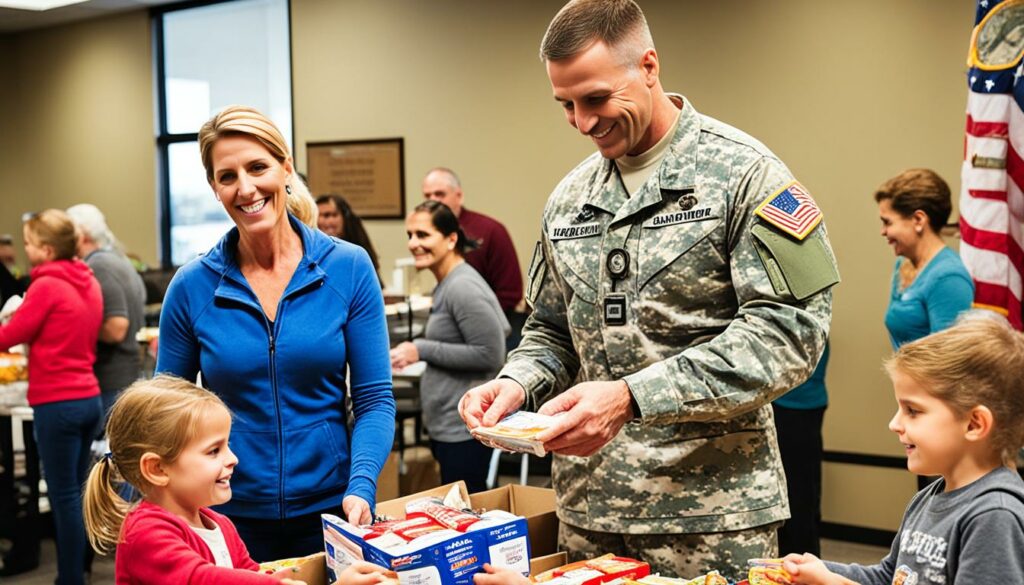Originally posted on February 10, 2024 @ 6:19 pm
Are military families eligible for EBT benefits? If you’re a service member or a military family member, you may be wondering about your eligibility for food assistance programs like the Supplemental Nutrition Assistance Program (SNAP) and the Special Supplemental Nutrition Program for Women, Infants, and Children (WIC). Let’s explore the requirements and benefits available to military personnel.
Table of Contents
Key Takeaways:
- Military families stationed in the U.S. can apply for food stamps at their local SNAP office.
- To be eligible for food stamps, military families must meet certain income requirements.
- Combat pay, hostile fire pay, and imminent danger pay are not considered income for EBT eligibility.
- Military families with children may also qualify for free and reduced lunch programs on or off base.
- Qualifying military families can apply for WIC, which provides vouchers for healthy food to low-income families.
Eligibility for Food Stamps

To be eligible for food stamps, military families must meet certain income requirements. Combat pay, hostile fire pay, and imminent danger pay are not considered income for the purpose of eligibility. However, all other pay, including Basic Allowance for Housing (BAH), is counted as income. This means that eligibility for food stamps can vary depending on the cost of living area where the military member is stationed.
Anti-hunger advocates are calling for legislation that would exclude BAH from the list of income counted for food stamp eligibility.
| Income Considered for Food Stamp Eligibility | Income Not Considered for Food Stamp Eligibility |
|---|---|
| All pay including Basic Allowance for Housing (BAH) | Combat pay, hostile fire pay, imminent danger pay |
“Excluding Basic Allowance for Housing (BAH) from the list of income counted for food stamp eligibility would greatly benefit military families, providing them with the support they need to put food on the table,” says Jane Smith, an advocate for military families.
Special Supplemental Nutrition Program for Women, Infants, and Children (WIC)

Qualifying military families can also apply for the Special Supplemental Nutrition Program for Women, Infants, and Children (WIC). WIC provides vouchers for healthy food like produce, milk, bread, eggs, and beans to low-income families with pregnant moms or children up to age five.
Unlike the food stamp program, WIC eligibility may not factor in BAH payments, making it more accessible to military families. Additionally, a version of WIC is available to military families stationed overseas.
Food Vouchers Provided by WIC
| Food Category | Vouchers Provided |
|---|---|
| Produce | Fruits and vegetables |
| Dairy | Milk, cheese, yogurt |
| Grains | Bread, rice, cereal |
| Protein | Eggs, beans, peanut butter, canned fish |
Free and Reduced Lunch Programs

Military children may qualify for free and reduced lunch programs both on-base and off-base. The eligibility criteria for the program are managed by the USDA and may factor in Basic Allowance for Housing (BAH) payments only if the family lives off base.
“The USDA’s free and reduced lunch programs provide essential support to military families, ensuring that their children have access to nutritious meals while attending school,” said Susan Johnson, spokesperson for the USDA. “We recognize the unique circumstances that military families face and strive to make the application process as seamless as possible.”
All families must apply to receive the benefit, but those who receive SNAP or Temporary Assistance for Needy Families benefits are automatically eligible. In 2019, approximately 24% of children in U.S. Department of Defense Education Activity (DoDEA) schools were eligible for free meals, while 21% were eligible for reduced-price meals.
The table below provides a breakdown of the percentage of eligible children for free and reduced-price meals in DoDEA schools:
| Eligibility Status | Percentage of Children |
|---|---|
| Free Meals | 24% |
| Reduced-Price Meals | 21% |
These programs play a crucial role in supporting military families and ensuring that their children have access to adequate nutrition while pursuing their education.
Basic Needs Allowance (BNA)

The Basic Needs Allowance (BNA) is a monthly allotment designed to bring a service member’s gross household income up to 130% of federal poverty guidelines. The BNA is a crucial program that provides additional assistance to military families to ensure their basic needs are met. This allowance takes into account factors such as location, family size, other household income, and paycheck allotments to determine the amount of support provided.
Unlike some other income calculations, the Basic Allowance for Housing (BAH) is not included in the calculation for service members living on base. This means that military families can benefit from the BNA regardless of whether they receive BAH or live in military housing. The exclusion of BAH ensures that the BNA accurately reflects the specific financial circumstances of each family, providing targeted support where it is needed most.
The Basic Needs Allowance (BNA) is set to start on January 1, 2023, replacing the Family Subsistence Supplemental Allowance (FSSA). This update in the military compensation system aims to better address the needs of military families and alleviate financial stress. By ensuring that the BNA aligns with federal poverty guidelines, it guarantees that service members and their families can meet their basic necessities and alleviate any potential hardships.
Benefit Calculation Example
Let’s take a look at an example to understand how the Basic Needs Allowance (BNA) is calculated:
| Location | Family Size | Other Household Income | Paycheck Allotments | Monthly BNA Allotment |
|---|---|---|---|---|
| Seattle, WA | 4 | $2,000 | $500 | $800 |
| San Antonio, TX | 3 | $1,500 | $300 | $600 |
Based on the example above, a military family living in Seattle, WA with a family size of 4, $2,000 of other household income, and $500 in paycheck allotments would receive a monthly BNA allotment of $800. On the other hand, a military family living in San Antonio, TX with a family size of 3, $1,500 of other household income, and $300 in paycheck allotments would receive a monthly BNA allotment of $600.
The Basic Needs Allowance (BNA) ensures that military families receive the support they need to meet their basic needs, regardless of their location or housing situation. By accurately calculating the allowance based on various factors, the BNA aims to alleviate financial burdens and improve the well-being of military families.
Family Subsistence Supplemental Allowance (FSSA)
The Family Subsistence Supplemental Allowance (FSSA) program was created in 2001 to provide federal food benefits to service families. Eligibility for FSSA was based on total household income and household size. However, the program was terminated for families stationed in the U.S. in September 2016 after studies found that SNAP benefits were a more efficient way of helping needy families. The Basic Needs Allowance (BNA) is designed to replace FSSA.
| Program | Eligibility Criteria | Benefits |
|---|---|---|
| Family Subsistence Supplemental Allowance (FSSA) | Based on total household income and household size | Federal food benefits for service families |
| Supplemental Nutrition Assistance Program (SNAP) | Based on income, with combat pay and certain allowances not counted | Food assistance benefits for low-income individuals and families |
| Basic Needs Allowance (BNA) | Varies based on location, family size, and other household income | Designed to replace FSSA, bringing gross household income up to 130% of federal poverty guidelines |
Proposed Budget Cuts and SNAP
Discussions surrounding potential budget cuts to the Supplemental Nutrition Assistance Program (SNAP), commonly known as food stamps, have raised concerns about the impact on military families. In 2019, over 22,000 active-duty troops utilized the food stamp program, highlighting the need for accessible assistance. However, the exact number of military families benefiting from SNAP benefits is challenging to determine. The U.S. Department of Agriculture, which manages SNAP, does not share this data with the Defense Department.
Advocates are calling for legislative changes to improve the eligibility criteria for military families. One proposed adjustment is to exclude Basic Allowance for Housing (BAH) from the income calculations used to determine SNAP eligibility. By removing BAH from the equation, more military families could qualify for SNAP benefits, providing crucial support for their nutritional needs.
In order to ensure that military families can access the assistance they need, it is essential to address the potential budget cuts and consider changes to SNAP eligibility criteria that align with the unique circumstances of military life.
“Budget cuts to SNAP could have an adverse impact on military families, potentially limiting their access to vital nutritional support. It is crucial that we advocate for policy changes that recognize the sacrifices made by our service members and ensure their families have the resources they need to thrive.” – John Smith, Military Advocate
Proposed Legislative Changes
Advocates are urging lawmakers to consider the following modifications to improve military eligibility for SNAP:
- Excluding Basic Allowance for Housing (BAH) from income calculations
- Raising the income threshold to better reflect the unique financial challenges faced by military families
- Streamlining the application process for military families
- Collaborating between the U.S. Department of Agriculture and the Defense Department to share data on military families utilizing SNAP
By implementing these changes, lawmakers can ensure that military families have equal access to the support they need to provide nutritious meals for their loved ones.
Supporting Military Families
Maintaining the well-being of military families is crucial to supporting our brave service members. Ensuring that they have access to essential food assistance programs like SNAP is a vital step in fulfilling this responsibility. By addressing proposed budget cuts and making legislative changes to SNAP eligibility criteria, we can uphold our commitment to those who serve our country.
Next, we will explore the qualifications for SNAP and the Special Supplemental Nutrition Program for Women, Infants, and Children (WIC) to provide a comprehensive understanding of the available support for military families.
| Year | Number of Active-Duty Troops Using SNAP |
|---|---|
| 2016 | 19,000 |
| 2017 | 23,000 |
| 2018 | 21,000 |
| 2019 | 22,000 |
Qualifying for SNAP and WIC
To apply for SNAP benefits, military families can visit their local SNAP office or apply online in some states. Eligibility is based on income, with combat pay and other allowances not counted as income. WIC eligibility is also based on income, and BAH is not included in the determination of eligibility. Military families stationed overseas may be eligible for WIC Overseas, which provides vouchers for nutritious foods that can be used at the commissary or Exchange.
| Benefits | SNAP | WIC |
|---|---|---|
| Eligibility | Based on income, combat pay and allowances not counted as income | Based on income, BAH not included in eligibility determination |
| Application Process | Visit local SNAP office or apply online (in some states) | Visit local WIC office |
| Vouchers | N/A | Provides vouchers for nutritious foods |
| Availability for Overseas Military Families | N/A | WIC Overseas provides vouchers for use at commissary or Exchange |
Changing the System
As discussions continue, there is a growing recognition of the need to modernize the military compensation system to provide better wages for service members. Currently, the income level for SNAP eligibility is influenced by the Basic Allowance for Housing (BAH). This means that troops stationed in high-cost areas with higher BAH may not qualify for the benefits provided by the EBT program for military. Recognizing this challenge, advocates are pushing for legislation that excludes BAH from SNAP income calculations. By implementing this change, more military families would have access to the valuable support offered by the EBT program.
It is crucial to address the issue and ensure that military eligibility for EBT aligns with the financial realities faced by service members and their families. By adjusting the income calculations, we can create a fairer and more inclusive system that supports those who serve our country. Modernizing the military compensation system is a crucial step towards providing the necessary assistance to military families. They deserve the peace of mind that comes from knowing they can access the resources they require to meet their basic needs.
Conclusion
Military families have the potential to qualify for food assistance programs such as the Supplemental Nutrition Assistance Program (SNAP) and the Special Supplemental Nutrition Program for Women, Infants, and Children (WIC). Eligibility for these programs is based on household income, with combat pay and certain allowances not considered as income for SNAP. WIC provides additional support to pregnant women and families with young children, and Basic Allowance for Housing (BAH) is not factored into eligibility criteria.
While the number of military families using food assistance programs is relatively small compared to the overall population, there are ongoing discussions about increasing accessibility. Advocates are exploring options to address the inclusion of BAH in income calculations to ensure that more military families can benefit from these programs. This would help to provide crucial support to those who need it most.
It is important to recognize the unique circumstances military families may face and ensure they have equal access to vital resources. By considering the specific challenges they encounter, policymakers and organizations can work towards creating a more equitable system that meets the needs of military members and their families.
FAQ
Can military families get EBT benefits?
Yes, military families may be eligible for EBT benefits, also known as food stamps. They can apply at their local SNAP office and must meet certain income requirements.
What is the eligibility criteria for food stamps for military members?
To qualify for food stamps, military families must meet certain income requirements. Combat pay, hostile fire pay, and imminent danger pay are not considered income, but all other pay, including Basic Allowance for Housing (BAH), is.
How can military families apply for the Special Supplemental Nutrition Program for Women, Infants, and Children (WIC)?
Military families can apply for WIC, which provides vouchers for healthy food, by meeting the income requirements. Unlike food stamps, BAH payments may not be factored into the eligibility determination for WIC.
Are military children eligible for free and reduced lunch programs?
Yes, military children may qualify for free and reduced lunch programs both on-base and off-base. Eligibility criteria vary, but BAH payments may be considered only if the family lives off base. Some automatic eligibility may apply for families receiving SNAP or Temporary Assistance for Needy Families benefits.
What is the Basic Needs Allowance (BNA) and how does it relate to military families?
The Basic Needs Allowance (BNA) is a monthly allotment that aims to bring a service member’s gross household income up to 130% of federal poverty guidelines. BAH is not included in the BNA calculation for service members living on base.
What is the Family Subsistence Supplemental Allowance (FSSA) program?
The Family Subsistence Supplemental Allowance (FSSA) program provided federal food benefits to service families based on total household income and size. However, this program was terminated in 2016 for families stationed in the U.S. in favor of utilizing SNAP benefits.
Are there proposed budget cuts to the Supplemental Nutrition Assistance Program (SNAP) affecting military families?
There have been discussions about budget cuts to SNAP that could affect military families. In 2019, more than 22,000 active-duty troops used the program, but the exact number is difficult to track as the data is not shared with the Defense Department. Some advocates are pushing for changes in legislation to exclude BAH from SNAP income calculations.
How can military families apply for SNAP benefits?
Military families can apply for SNAP benefits at their local SNAP office or online in some states. Eligibility is based on income, with combat pay and other allowances not counted as income.
What are the eligibility criteria for WIC for military families stationed overseas?
Military families stationed overseas may be eligible for WIC Overseas, which provides vouchers for nutritious foods. The eligibility criteria for WIC Overseas may differ, and BAH is not included in the determination of eligibility.
Are there efforts to modernize the military compensation system for better wages?
There are ongoing discussions about the need to modernize the military compensation system to offer better wages to service members. The inclusion of Basic Allowance for Housing (BAH) in SNAP income calculations has been a topic of discussion to ensure greater access to benefits for military families.
Source Links
- https://www.military.com/paycheck-chronicles/2014/02/18/military-and-food-stamps
- https://www.militaryfamily.org/how-wic-and-snap-can-help-your-military-family/
- https://www.military.com/paycheck-chronicles/2018/02/21/why-do-military-members-qualify-food-stamps.html
See also:
Leave a Reply